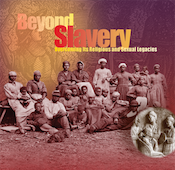Beyond Slavery
Explore the Conference
Explore the Conference by Subject
Slavery in Christian, Jewish, and Muslim Scripture and Religious Law
Christianity, Religion of the Slaveholders and the Enslaved
Sexual Assault and Exploitation Under U.S. Slavery and Jim Crow
How Slavery Has Shaped Our Understandings of Marriage and Friendship
Slavery, Violence, and the State
Beyond Slavery:
Overcoming Its Religious
& Sexual Legacy
Sylvester Johnson, read by Monique Moultrie:
Biblical Debates
Over Slavery
American debates over the institution of slavery were most intense during the nineteenth century. This was largely because abolitionists, who opposed slavery, had by this time begun to organize to end the institution. Slaveholders and their supporters fought back, developing complex arguments to support slavery. The two sides disagreed sharply. Supporters of slavery tried to prove that blacks were naturally suited to slavery and that they could not be trusted with freedom. Some pro-slavery writers attacked the sexuality of blacks, especially black women, by describing them as ungodly people-heathens-whose sexual desires were animal-like. Slavery advocates also used the legend of Noah in Genesis 9 to argue that enslaving blacks fulfilled divine will. Abolitionists, on the other hand, argued that blacks were no less human than whites and had a right to be free. These opponents of slavery claimed that the Bible would not allow for the cruelties of slavery. In spite of their differing positions on slavery, pro-slavery activists and abolitionists agreed on one thing: they both assumed that the Bible was a source of divine revelation that should be used to develop American laws and establish ethical norms. Both sides used biblical interpretation, Bible stories, and religious logic to defend their positions.
This video was recorded on October 15-16, 2006 as part of the conference, "Beyond Slavery: Overcoming Its Religious and Sexual Legacy." It was sponsored by the Feminist Sexual Ethics Project in the Near Eastern and Judaic Studies Department at Brandeis University.
